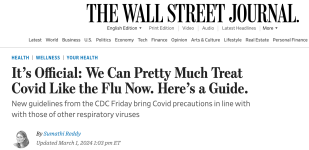Flu (our Flu) feels vindicated today. Pop the cork sir. The CDC has finally caved.
View attachment 12268
A case of Covid no longer means
isolating for five days, according to the latest guidance from the Centers for Disease Control and Prevention released Friday. It’s the latest sign of the virus’s normalization four years after it upended our lives.
You should now follow the same precautions with Covid as you take with the flu, according to new guidelines from the CDC. That means staying home until you’ve gone a day with no fever and improving symptoms. Take other precautions for the next five days, including wearing a mask and limiting close contact with others.
Those are the same steps the CDC recommends for other respiratory viruses.
“Covid-19 is still an important public health threat, but it is not the emergency that it once was,” said Dr. Brendan Jackson, who leads the respiratory virus response for the CDC’s National Center for Immunization and Respiratory Disease, on Friday.
“And its health impacts increasingly resemble those of other [respiratory viral] illnesses, including influenza and RSV.”
Plenty of Americans dropped Covid testing and isolation periods long ago as the virus became more routine. Many schools and workplaces hadn’t been enforcing the stricter CDC guidance, and some states have already relaxed their Covid guidance.
Many doctors say that at this point, common sense should guide you. If you feel sick, stay home. When you’re feeling well enough to go out but still have some symptoms, it’s a good idea to wear a mask indoors to protect others. Be more cautious if you’re going to be around more vulnerable people, such as those who are immunocompromised or elderly.
Even if you’re not worried about health risks, there’s still the disruption of getting sick. So if you have a
big trip coming up, an important job deadline looming or you just don’t want to juggle work and a sniffly kid, adjust your precautions to fit your tolerance level.
Just like the flu?
Covid-19 hospitalization and death numbers are still higher than those of the flu, but the gap has narrowed since earlier in the pandemic.
However, public health officials cautioned that Covid still isn’t the same as the flu or other respiratory viruses. “Let’s be clear. Covid-19 is not the flu,” said Jackson at the CDC. “It still causes more serious illness and leads to more lasting effects,” he said.
Public-health experts and physicians note that Covid is still a disease that is cited as a cause of death in more than 1,000 people a week, according to CDC data. And long Covid, with symptoms that can linger months and even years, hasn’t gone away. <---yeah, NOT buying this part however.
The CDC’s relaxed Covid guidelines don’t apply to healthcare settings, including nursing homes. People who are at higher risk for severe illness, such as the elderly, the immunocompromised, and pregnant women, should see a healthcare professional if they feel sick to get tested and potentially treated.
View attachment 12269




